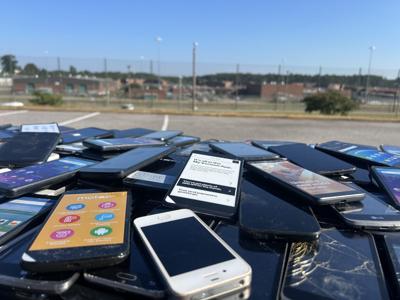A plan to allow cellphone jamming in state prisons can move forward, the Federal Communications Commission decided Tuesday.
The three-person commission’s unanimous vote represented a major win for state officials who have long said jamming is the best way to deal with an inundation of contraband cellphones in the state prison system. The voted will open up the policy for public comment, to be followed by another vote at a to-be-determined date.
Current and former state Department of Corrections directors praised the commission for considering the change at all, after more than a decade of trying and failing to get any movement on the issue.
“Inmates with illegal cellphones commit serious crimes,” corrections director Joel Anderson said in a Tuesday statement. “It’s that simple.”
Commission Chairman Brendan Carr told the story of Capt. Robert Johnson, an anti-contraband officer who in 2010 was shot six times at his Sumter home. Angry about the loss of a recent contraband package Johnson’s team had seized, inmates used an illegal cellphone to order the hit.
“Thankfully, Capt. Johnson survived, but in many ways, his story is not unique,” Carr told the commission Tuesday.
Cellphones have also allowed inmates to run extortion schemes and major drug rings, all from within prison walls, state officials have said. Similar crimes have taken place across the country, Carr said.
Officials have said the technology within prisons is extremely precise, blocking signals only within the walls.
But Commissioner Anna Gomez said she still worried about jamming devices interfering with nearby homes and businesses, as well as emergency calls. She asked for the commission to start with a smaller pilot program to see how the technology works.
Cellphone jamming is already used in federal prisons.
“While the problem we are trying to address is of critical importance, I worry about the potential unintended consequences of permitting jamming by non-federal actors and permitting jamming equipment to formally enter the American market,” Gomez said.
South Carolina will be ready as soon as a change takes effect, officials said earlier this month.
The state was the first in the nation to use a technology tracking cell signals within prisons, which allows officials to alert cellphone companies of unauthorized devices and get them turned off. Officials have compared the process to a game of “Whac-A-Mole,” saying it’s time-consuming to identify and get phones turned off individually.
That technology, which legislators have spent $18.5 million over two years to install and maintain, can be adjusted to block all cellphone signals within a prison instead of just detecting them. All the state needs is the commission’s OK.
Tuesday’s vote follows turnover at the commission.
A commissioner since 2017, Carr took over in January after President Donald Trump named him chairman. Gomez previously led the commission from 2023 as President Joe Biden’s choice. The Senate confirmed Trump’s other appointee, Olivia Trusty, in June.
SC Daily Gazette is part of States Newsroom, a nonprofit news network supported by grants and a coalition of donors as a 501c(3) public charity. SC Daily Gazette maintains editorial independence. Contact Editor Seanna Adcox for questions: info@scdailygazette.com.













